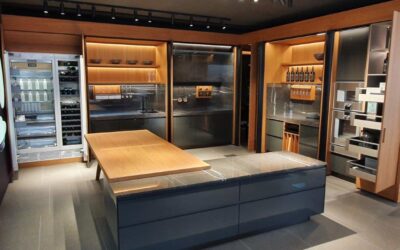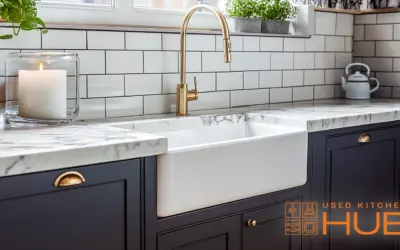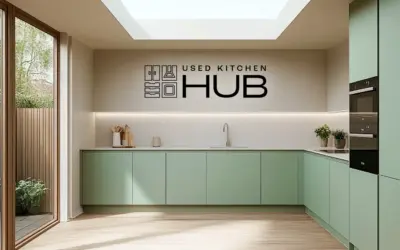Eco-Chic Kitchen Up-cycling: 5 Sustainable Materials That Save You Money
Renovating your kitchen doesn’t have to cost the earth, literally or financially. More homeowners today are **embracing upcycling** as a route to creating eco-chic spaces that combine style, savings, and sustainability. At the heart of this trend are five powerful materials that **reduce your environmental impact** without sacrificing design or durability: reclaimed wood, bamboo worktops, low-VOC finishes, recycled glass, and eco-certified cabinetry.
These materials don’t just align with your values, they also help you craft a unique, characterful kitchen that stands apart from mass-produced designs. Whether you’re breathing new life into existing units or starting from scratch with carefully sourced pieces, this guide will show you how to build a **circular kitchen** that’s both beautiful and budget-conscious.
At Used Kitchen Hub, we don’t just talk about sustainability, we deliver it at scale. Our platform connects eco-minded renovators with premium pre-loved and [ex-display kitchens](https://usedkitchenhub.com/kitchen-category/ex-display-and-used-kitchens) from iconic brands. Whether you’re replacing your own kitchen or looking to purchase an entire upcycled one, we manage the entire resale process – valuation, marketing, professional removal and delivery, so sustainability is hassle-free.
Reclaimed Wood Countertops: Timeless Character, Low Carbon Impact
Reclaimed wood offers warmth, history, and sustainability in one versatile package. Salvaged oak or elm beams from barns and industrial buildings are not only cheaper than new timber but also far better for the environment. Each piece has a story, with knots and grain patterns that add authenticity to your kitchen.
Sourcing locally can enhance the eco-benefit. Reclamation yards and salvage markets across the UK often carry hardwood worktops that would otherwise be headed to landfill. Many come pre-sanded or treated with natural oils like linseed or tung, which makes them both food-safe and waterproof.
Installation can be simple for DIYers, especially with prefabricated blocks – or handled by professional joiners for complex butcher-block or end-grain designs. Regular oiling keeps reclaimed surfaces looking fresh while small scratches and marks can be sanded out, extending their life indefinitely.
Explore our selection of pre-loved and reclaimed kitchen listings to find options that pair perfectly with upcycled worktops.
Bamboo Worktops: Fast-Growing, High-Performance
Bamboo is a standout for **sustainability** thanks to its rapid regrowth cycle, some species mature within just five years. But it’s also a workhorse in the kitchen, especially when manufactured using cross-laminated or strand-woven techniques that increase density and resistance to wear.
Popular suppliers like IKEA and Laminex now offer bamboo worktops in a variety of tones and styles, from pale blondes to rich caramels. **Pre-oiled options** are ready to install, while raw formats allow you to customise the finish with water-based polyurethane or plant-based oils.
To get the best performance, ensure a moisture barrier is installed beneath the worktop and seal the surface thoroughly. Opt for EU-sourced bamboo when possible to reduce carbon miles and support more transparent supply chains.
Want to make sure your kitchen project stays eco from surface to service? Our removal teams specialise in dismantling kitchens with care, so your materials stay intact and reusable.
Low-VOC Finishes: Healthier Homes, Cleaner Air
Traditional paints and varnishes often release volatile organic compounds (VOCs), which contribute to indoor air pollution and can linger long after application. Low-VOC alternatives drastically reduce this risk, helping you maintain a fresher, safer space, especially in high-use areas like the kitchen.
Brands such as Earthborn, Little Greene, and Farrow & Ball now offer eco-conscious ranges in a wide variety of colours and finishes. Whether you’re repainting cabinet doors or sealing new surfaces, these products combine aesthetics with peace of mind.
Application is straightforward: just ensure good ventilation, wear protective gloves, and allow adequate drying time between coats. Upcycled cabinets, in particular, benefit from low-VOC refinishing, especially when existing paint is stripped using non-toxic removers. The result is a fresh, non-toxic finish that’s easy to maintain and safe for everyone in your home.
Learn more about sustainable refurbishing in our blog series.
Recycled Glass Surfaces: Brilliant, Durable, Waste-Reducing
Recycled **glass worktops** and splashbacks bring a pop of colour and texture to eco-conscious kitchens. Made from post-consumer materials such as bottles and jars, these surfaces help divert waste from landfill while offering high performance.
Options range from subtle, speckled composites to dramatic mosaic inlays suspended in resin. Brands like Cosentino ECO and Caesarstone’s Recycled Series lead the charge in this category, with slabs that rival quartz in strength and scratch resistance.
Installation should be handled by professionals due to the weight and precision required. Reinforced carcasses may be necessary, and simplified edge treatments can help lower fitting costs. Ask local showrooms about end-of-line stock or remnants to keep your investment low and sustainable.
Eco-Friendly Cabinets: Designed for Disassembly
Cabinetry forms the backbone of any kitchen, and choosing sustainable versions pays off over decades. Look for FSC-certified plywood carcasses or formaldehyde-free MDF that meets stringent air-quality standards. Many newer boards also include recycled fibres, adding to their circular credentials.
You don’t have to replace everything. Many homeowners keep the existing carcass and simply upgrade fronts and fittings using upcycled components or new eco-certified panels. This reduces waste and expense while giving you the freedom to reimagine the look of your space.
Some ranges even support full disassembly, allowing for easy recycling or reconfiguration down the line. Modular systems with cam-lock or screw fittings rather than glue not only make for quicker installation but also align with circular design thinking.
For bespoke cabinet reuse advice or to value your existing kitchen, request a free resale valuation.
Putting It All Together: A Circular Kitchen Worth Investing In
Sustainable kitchen renovation is no longer niche, it’s smart. By combining these five materials thoughtfully, you’ll reduce emissions, lower your spend, and gain a kitchen filled with character and conscience.
Choosing reclaimed or rapidly renewable materials not only benefits the environment, it also infuses your space with meaning. Your countertops will tell stories. Your cabinets will last decades. And your air will be cleaner every time you cook.
If you’re looking for real-world examples of how upcycling transforms kitchens, Used Kitchen Hub showcases completed eco-renovations, complete with cost breakdowns, buyer tips and sustainable product links. And when you’re ready to take the next step, our curated selection of ex-display and pre-loved kitchens is a great place to begin.
FAQs
How do I choose the best materials for my up-cycled kitchen?
Look for locally sourced, certified materials (FSC timber, GreenGuard paints), balance upfront cost against lifespan, and prioritise reclaimed or rapidly renewable resources.
When should I up-cycle instead of buying new?
Up-cycle whenever the existing component is structurally sound, re-facing cabinetry or refinishing worktops preserves embodied energy and often costs less than replacement.
Which tasks are suitable for DIY vs professional installers?
DIY for sanding, oiling and assembling RTA cabinets; hire professionals for glass templating, complex joinery and electrical or plumbing modifications.
Are low-VOC finishes genuinely safer?
Absolutely. They drastically reduce toxic emissions and improve indoor air quality. They’re especially beneficial for families with children or those sensitive to chemicals.
What maintenance do sustainable materials require?
Monthly oiling for wood, annual resealing for bamboo, gentle cleaning of glass surfaces, and periodic checks of cabinet fixings to keep your eco-chic kitchen in top condition.
What is a circular kitchen?
A circular kitchen uses materials and designs that prioritise reuse, recycling, and low waste. This includes choosing durable materials, designing for disassembly, and using upcycled or reclaimed components.
Is bamboo really more sustainable than hardwood?
Yes. Bamboo regenerates in a few years, compared to decades for hardwood. It also requires fewer pesticides and less water during growth, making it a more resource-efficient option.
Can I install recycled glass worktops myself?
Due to their weight and installation requirements, recycled glass surfaces should be fitted by professionals. However, you can reduce costs by sourcing offcuts or remnants.


